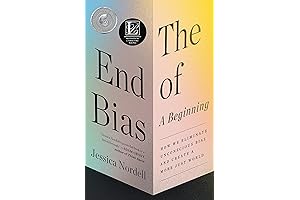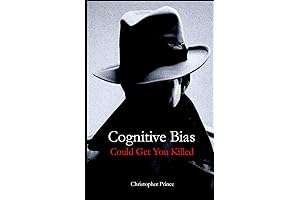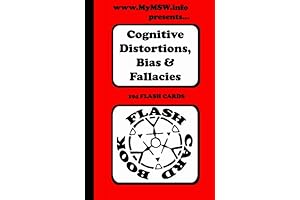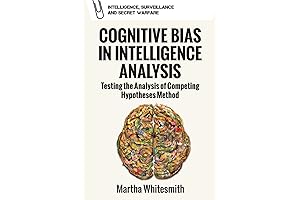· cognitive bias · 13 min read
Best Cognitive Bias Books: Insightful Guides to Enhance Decision-Making
Explore our selection of the best cognitive bias books to gain a deeper understanding of the mental shortcuts that influence our thinking and decision-making.
Cognitive biases are mental shortcuts that can lead to errors in judgment and decision-making. Understanding these biases is essential for improving our thinking and making better choices. Our selection of the best cognitive bias books provides comprehensive explanations, real-world examples, and practical strategies for overcoming these biases.
Overview

PROS
- Simplifies 190 common cognitive biases for easy comprehension by 5th graders.
- Captivates young minds with engaging and relatable examples.
- Enhances critical thinking skills by fostering an understanding of biases that influence decision-making.
CONS
- May require parental guidance for younger readers.
- Some concepts may be too advanced for the intended audience.
This exceptional guide empowers 5th graders to unravel the complexities of cognitive biases – mental shortcuts that shape our thinking. With clarity and simplicity, the book demystifies 190 common biases, equipping young minds with an understanding of how these biases influence their thoughts and decisions.
The book's interactive approach captivates readers with relatable examples, transforming the learning process into an engaging adventure. It fosters critical thinking skills by highlighting the impact of biases on perception and judgment. By exploring a diverse range of biases, from confirmation bias to the availability heuristic, children gain valuable insights into the workings of their own minds.
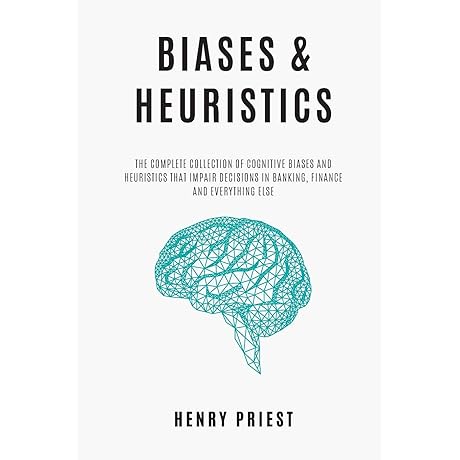
PROS
- Comprehensive collection of cognitive biases, providing an in-depth understanding of their impact on decision-making.
- Explores both biases in banking and finance, as well as general heuristics that affect decision-making in various contexts.
- Delivers practical strategies for mitigating cognitive biases and making more informed choices.
- Written in an engaging and accessible style, making complex concepts easy to grasp.
- Serves as a valuable resource for professionals, students, and anyone seeking to make wiser decisions.
CONS
- Some readers may find the sheer volume of information overwhelming.
- The focus on banking and finance may limit its direct relevance for readers outside those fields.
Delve into the captivating world of cognitive biases and heuristics with this comprehensive guide, 'BIASES and HEURISTICS.' This book unveils the intricate tapestry of mental shortcuts and cognitive traps that shape our decision-making processes. By delving into the spectrum of biases, you'll gain a deeper understanding of how they influence your judgments, especially in critical areas like banking, finance, and beyond.
The authors illuminate how cognitive biases and heuristics can lead to both rational and irrational choices. They provide valuable insights into the decision-making processes in banking and finance, highlighting common pitfalls and potential blind spots. Moreover, the book extends its reach, exploring heuristics in general decision-making, making it a valuable resource for individuals from all walks of life seeking to make wiser choices.
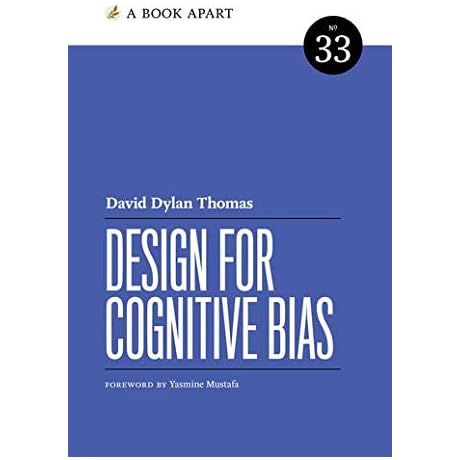
PROS
- Provides a comprehensive overview of cognitive biases and their implications for design.
- Offers practical guidance on how to mitigate biases in product development.
CONS
- Can be somewhat technical for non-designers.
- Some sections could benefit from more real-world examples.
DESIGN FOR COGNITIVE BIAS is an insightful and practical guide to understanding and mitigating cognitive biases in product design. The authors provide a clear and concise overview of the different types of biases that can affect users, and they offer specific strategies for how to design products that are less susceptible to these biases.
One of the things that makes this book so valuable is that it goes beyond simply identifying cognitive biases. The authors also provide practical guidance on how to mitigate these biases in product design. They offer specific techniques and strategies that designers can use to create products that are more user-friendly, efficient, and effective. I highly recommend this book to anyone who is interested in learning more about cognitive biases and how to mitigate them in product design.

PROS
- Thoroughly elucidates various cognitive biases, shedding light on their pervasive influence on our thinking.
- Presents a comprehensive framework for identifying and mitigating biases, empowering readers to make more rational decisions.
CONS
- Some sections may be overly academic, requiring a focused mindset for comprehension.
- Lacks specific examples or case studies to illustrate the practical application of bias reduction techniques.
Prepare to embark on an eye-opening journey with 'End of Bias: A Beginning'. This illuminating guide unveils the pervasive role of cognitive biases, the invisible forces that subtly shape our perceptions, judgments, and decisions. Through meticulous analysis, the authors provide a comprehensive framework for identifying and understanding these biases, empowering readers to cultivate more objective and well-rounded perspectives.
Delving into the depths of our cognitive processes, 'End of Bias' meticulously dissects a vast spectrum of biases, from confirmation bias to the illusory correlation. With clarity and precision, the authors unravel the intricate mechanisms behind each bias, shedding light on their origins and profound impact on our decision-making. This invaluable knowledge equips us to recognize and mitigate these biases, fostering a mindset that embraces critical thinking and evidence-based reasoning.

PROS
- Comprehensive exploration of cognitive biases, providing deep insights into how our minds interpret information.
- Engaging and accessible writing style that demystifies complex psychological concepts.
CONS
- Some sections may require a foundational understanding of psychology to fully grasp the content.
- While the book covers a wide range of biases, it could benefit from providing more in-depth analysis of each.
In 'The Biased Brain,' the author takes us on an enlightening journey through the intricate world of cognitive biases. With meticulous precision, they unravel the ways in which our minds filter and distort information, shaping our perceptions and decisions. By shedding light on these biases, the book empowers us to critically evaluate our own thinking and make more informed choices.
The author's comprehensive approach delves into a vast array of biases, including confirmation bias, availability bias, and the halo effect. They skillfully weave together research findings, real-life examples, and personal anecdotes to illustrate how these biases manifest in our daily lives. The result is a thought-provoking and highly engaging read that will challenge your assumptions and broaden your perspective.

PROS
- Uncovers implicit and cognitive biases in social media, writing, and debate.
- Designed by a Harvard educator to improve critical thinking skills for teens and adults.
CONS
- May require a basic understanding of cognitive biases to fully grasp the content.
- Not suitable for children under 13 years of age.
52 Essential Critical Thinking is a valuable resource for individuals seeking to enhance their critical thinking abilities. These engaging flashcards provide a structured approach to identifying and understanding cognitive and implicit biases that can influence our perceptions and decision-making. Each card presents a specific bias, its definition, real-world examples, and probing questions to stimulate critical thinking.
The diverse range of biases covered, such as confirmation bias, anchoring effect, and groupthink, empowers users to recognize and mitigate these biases in various contexts. By incorporating personal anecdotes and real-world scenarios, the cards foster a deeper understanding of how biases manifest in our lives and impact our interactions with others. Whether you're a student, professional, or simply eager to improve your critical thinking skills, these flashcards serve as an effective tool for personal growth and intellectual development.

PROS
- It's packed with information on cognitive biases and how they can affect your decision-making.
- The book is well-written and easy to understand.
- It provides practical tips on how to overcome cognitive biases.
CONS
- It can be a bit overwhelming at times.
- Some of the examples are a bit too academic.
Cognitive Bias Could Get You Killed! is a fascinating and informative book that explores the many ways in which our brains can trick us into making bad decisions. The book is written in a clear and engaging style, and it is packed with real-world examples of how cognitive biases have led to disasters, both large and small.
If you're interested in learning more about cognitive biases and how to overcome them, I highly recommend this book. It's a valuable resource for anyone who wants to think more clearly and make better decisions.

PROS
- Convenient and portable way to learn about cognitive biases and fallacies.
- Clear and concise definitions and examples on each card.
CONS
- May not be comprehensive enough for advanced students of cognitive science.
- Lack of interactive elements may limit engagement for some learners.
The Cognitive Distortion Flash Cards are an excellent resource for anyone who wants to improve their critical thinking skills and make better decisions. The cards are well-organized and easy to use, and they provide clear and concise definitions and examples of common cognitive biases and fallacies. I especially appreciate that the cards are portable, so I can take them with me wherever I go.
I have found the Cognitive Distortion Flash Cards to be a valuable tool in my own learning. I have used them to identify biases in my own thinking, and I have also used them to help others understand how cognitive biases can affect decision-making. I highly recommend these cards to anyone who wants to improve their critical thinking skills and make better decisions.

PROS
- Provides a comprehensive framework for understanding and mitigating cognitive biases in intelligence analysis.
- Utilizes case studies and real-world examples to illustrate the impact of biases on intelligence assessments.
- Offers practical strategies and tools for analysts to overcome cognitive limitations.
CONS
- May be too technical for non-intelligence professionals.
- Some examples may be outdated or specific to certain intelligence agencies.
Embark on an enlightening journey into the realm of cognitive biases, their pervasive influence on intelligence analysis, and the profound impact they can have on national security. 'Cognitive Bias in Intelligence Analysis' meticulously examines the Analysis of Competing Hypotheses Method, unlocking a treasure trove of insights and practical strategies to empower analysts in overcoming these cognitive pitfalls.
This indispensable guide delves into the depths of human cognition, unraveling the intricate web of biases that can cloud our judgment and compromise the accuracy of intelligence assessments. Grounded in real-world examples, the authors illuminate the insidious ways in which cognitive biases can distort our perceptions, leading to flawed conclusions and misinterpretations of critical information.

PROS
- Unveils a vast array of over 160 cognitive biases, equipping readers with a profound understanding of their impact on judgment and decision-making.
- Provides clear and concise explanations of each bias, supported by real-world examples and relatable anecdotes, making the content both accessible and engaging.
- Empowers individuals to recognize and mitigate cognitive biases, promoting more rational thinking, informed choices, and effective communication.
CONS
- May overwhelm beginners who are new to the field of cognitive biases.
- Some readers may find the comprehensive nature of the book slightly repetitive.
Immerse yourself in the captivating world of cognitive biases with this extraordinary guide that unveils the remarkable impact these mental shortcuts have on our perceptions, decisions, and interactions. Through a thorough exploration of over 160 cognitive biases, the book empowers readers with an unparalleled understanding of these psychological phenomena. Presented in an engaging and relatable manner, each bias is meticulously explained, shedding light on its unique characteristics and real-world manifestations.
As you delve into this comprehensive resource, you'll discover the profound influence cognitive biases exert on our daily lives, from shaping our judgments to influencing our decision-making processes. The captivating anecdotes and relatable examples breathe life into complex concepts, making them both accessible and thought-provoking. By recognizing and understanding these biases, individuals gain the power to mitigate their influence, fostering more rational thinking, informed choices, and effective communication. This guide serves as an invaluable tool for anyone seeking to enhance their critical thinking skills, improve their decision-making abilities, and navigate the complexities of human behavior with greater awareness and understanding.
Our collection of cognitive bias books includes a wide range of topics, from the classic work of Daniel Kahneman to the latest research on unconscious bias. Whether you're a student, a professional, or simply interested in understanding the human mind, these books will provide valuable insights into the cognitive biases that shape our thoughts and actions. Don't miss out on these essential resources for enhancing your decision-making skills.
Frequently Asked Questions
What is the best cognitive bias book for beginners?
For beginners, we recommend starting with the book "Cognitive Biases Simply Explained: 190 Common Thinking Errors" by Daniel Kahneman. This book provides a clear and concise overview of the most common cognitive biases and how they can impact our decision-making.
What books are available on cognitive heuristics?
For readers interested in cognitive heuristics, we recommend "BIASES and HEURISTICS: The Complete Collection of Cognitive Biases and Heuristics That Impair Decisions in Banking, Finance and Everything Else." This comprehensive guide explores both cognitive biases and heuristics, providing a deeper understanding of their real-world implications.
Are there any books that focus on cognitive bias in specific fields?
Yes, our selection includes books that examine cognitive bias within specific fields. For example, "Cognitive Bias in Intelligence Analysis" delves into the impact of cognitive biases on intelligence analysis and decision-making.
What resources are available on implicit and unconscious biases?
To understand implicit and unconscious biases, we recommend "52 Essential Critical Thinking: Smart Flash Cards to Uncover Implicit Biases." This book provides practical tools and exercises to identify and address these biases in everyday life.
Are there any books that offer practical strategies for overcoming cognitive biases?
For readers seeking practical guidance, "End of Bias: A Beginning" by Jessica Nordell offers a comprehensive approach to recognizing and overcoming cognitive biases in decision-making and everyday life.



